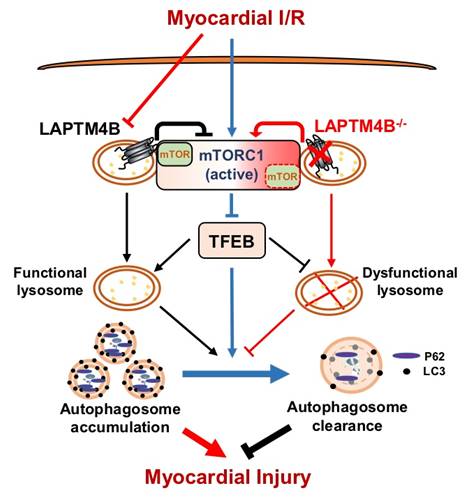Researchers Reveal Contribution of a Lysosomal-Associated Transmembrane Protein to Impaired Autophagic Flux During Myocardial Ischemia/Reperfusion Injury
A recent study led by the researchers from Shanghai Institute of Nutrition and Health (SINH) of the Chinese Academy of Sciences (CAS) and Sun Yat-sen University (SYSU) has revealed the cardioprotective effects of LAPTM4B, a lysosomal-enriched transmembrane protein, which plays an essential role in regulating the autophagic flux during myocardial ischemia/reperfusion (I/R) injury.
Restoring blood supply timely after myocardial infarction is essential to save the ischemic heart, accompanied by reperfusion injury, termed I/R injury. However, the clinical protective effect of existing interventions is very limited. Therefore, it is of great scientific significance and clinical demand to find new mechanisms to reduce I/R injury.
Autophagy is essential for cell homeostasis maintenance. It has been found that autophagic flux is impaired during myocardial I/R, which leads to the accumulation of autophagosome, causing the death of cardiomyocytes. However, the underlying molecular mechanisms remain largely unexplored.
In the recent study, using the myocardial I/R mouse model and hypoxia/reoxygenation cardiomyocyte model, combined with loss-of-function and gain-of-function approaches, the researchers uncovered the role of the lysosomal membrane protein LAPTM4B in myocardial I/R injury and protection via regulating autophagic flux through the modulation of the mTORC1/TFEB axis. Researchers showed that LAPTM4B is downregulated in I/R hearts and hypoxia/reoxygenation cardiomyocytes, and its overexpression is protective. Moreover, LAPTM4B promotes autophagic flux through the restoration of I/R-impaired autophagosome clearance, resulting in cardioprotection.
Furthermore, these protective effects of LAPTM4B are dependent on interaction with mTOR through its EC3 domain, which subsequently suppresses the activation of mTORC1 signaling. Conversely, the downregulation of LAPTM4B contributes to the impairment of autophagic flux via the unopposed activation of mTORC1 signaling and suppresses TFEB activity during myocardial I/R injury.
These results uncover a new function of LAPTM4B in the heart and indicate that the mTORC1/TFEB pathway is a key mechanism underlying the regulation of LAPTM4B in autophagic flux during myocardial I/R. Moreover, the findings suggest the importance of the maintenance of lysosomal function in limiting myocardial I/R injury.
The study entitled “Downregulation of LAPTM4B Contributes to the Impairment of the Autophagic Flux via Unopposed Activation of mTORC1 Signaling during Myocardial Ischemia/Reperfusion Injury” was published online in Circulation Research on 23 Jul 2020.
Dr. GU Shanshan from SINH and SYSU is the first author, and Dr. YANG Huang-Tian from SINH and Dr. CAO Nan from SYSU are the corresponding authors. The study was supported by Prof. WEI Meng and Dr. MA Jian from Shanghai Jiao Tong University Affiliated Sixth People’s Hospital as well as Prof. ZHOU Rouli from the Peking University. The study was funded by grants from the National Natural Science Foundation of China, the Strategic Priority Research Program of the CAS, National Key R&D Program of China, and the Guangdong Innovative and Entrepreneurial Research Team Program.

Schematic representation of the therapeutic effect and mechanisms of LAPTM4B during myocardial I/R injury. (Image provided by Dr. Yang's group)
Media Contact:
WANG Jin (Ms.)
Shanghai Institute of Nutrition and Health,
Chinese Academy of Sciences
Email: sibssc@sibs.ac.cn
